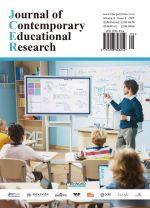Impact of Online Music Teaching Platforms on Student Learning Outcomes
Abstract
To address the widespread challenges of insufficient classroom participation, difficulty maintaining learning interest, and inaccurate learning outcome assessment in existing teaching models, this study introduces a hybrid and dual-teacher classroom model. Based on big data and online platforms, this study constructs a music teaching resource system that integrates online micro-lessons, real-time interaction, virtual choirs, collaborative composition, and learning behavior tracking to enhance the openness and personalization of teaching. Through comparative experiments, the study focuses on changes in student knowledge acquisition, musical skills, learning interest, and classroom engagement. Results show that the experimental group significantly outperforms the control group in terms of improvement in knowledge test scores, rhythm and pitch performance, task completion rate, and scores on the learning motivation questionnaire. Differences are particularly prominent in interaction frequency and the expressiveness of the work. The study shows that Group A demonstrates significant improvement in all three dimensions: interest increases from 3.1 to 4.2; autonomous learning motivation increases from 3.0 to 4.1; emotional engagement increases from 3.2 to 4.3, demonstrating strong positive effects. Experimental Group B shows the greatest improvement, with interest increasing from 3.0 to 4.5, autonomous learning motivation from 2.9 to 4.4, and emotional engagement from 3.1 to 4.6, indicating the most significant improvements in learning attitudes and emotions.
References
Luo W, 2023, Online Distance Music Teaching Platform Based on Internet Plus. International Journal of Information and Communication Technology, 22(1): 73–88.
Zhu Q, 2023, Research on an Online Teaching Platform for College Music Course Based on Internet of Things Technology. International Journal of Information and Communication Technology, 23(1): 1–14.
Yu H, Zou Z, 2023, The Music Education and Teaching Innovation Using Blockchain Technology Supported by Artificial Intelligence. International Journal of Grid and Utility Computing, 14(2–3): 278–296.
Yang X, 2024, The Perspectives of Teaching Electroacoustic Music in the Digital Environment in Higher Music Education. Interactive Learning Environments, 32(4): 1183–1193.
Beirnes S, Randles C, 2023, A Music Teacher’s Blended Teaching and Learning Experience During COVID-19: Autoethnography of Resilience. International Journal of Music Education, 41(1): 69–83.
Cipta F, Sukmayadi Y, Milyartini R, et al., 2024, Optimizing AI-Powered Music Creation Social Media to Amplify Learning Content. Jurnal Kependidikan: Jurnal Hasil Penelitian dan Kajian Kepustakaan di Bidang Pendidikan, Pengajaran dan Pembelajaran, 10(3): 881–892.
Kuebel C, Haskett E, 2023, “I’m Doing the Best I Can”: Teaching General Music in the Time of COVID-19. Update: Applications of Research in Music Education, 41(2): 28–37.
Sang T, Dean K, 2025, Application of Human-Computer Interaction in Online Music Education: A Case Study of “Little Leaf Music Education”. Asian Journal of Vocational Education and Humanities, 6(1): 73–86.
Gül G, 2023, Use of Technology-Supported Educational Tools in General Music Education and Its Contribution to the Process of Music Education. Acta Educationis Generalis, 13(2): 63–81.
Løkke Jakobsen M, Hebert D, Ørngreen R, 2025, Synchronous Online Instrumental Music Teaching in Cross-Cultural Learning Contexts. International Journal of Music Education, 43(2): 288–309.
Safian A, Saidon Z, Nasrifan M, et al., 2024, Design and Development of E-MARZ: A Practical Guide to Implementing Cost-Effective VR Experiences for Music Education. Journal of Advanced Research in Applied Sciences and Engineering Technology, 40(1): 129–145.
Jiang H, Cheong K, 2024, Developing Teaching Strategies for Rural School Pupils’ Concentration in the Distance Music Classroom. Education and Information Technologies, 29(5): 5903–5920.

